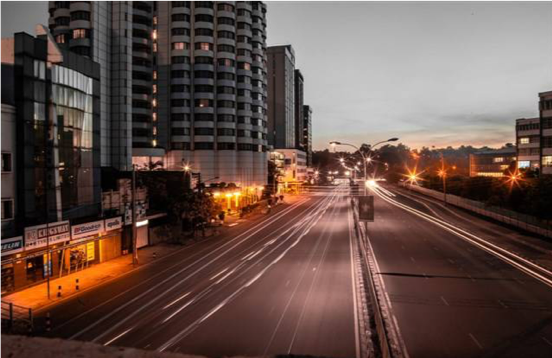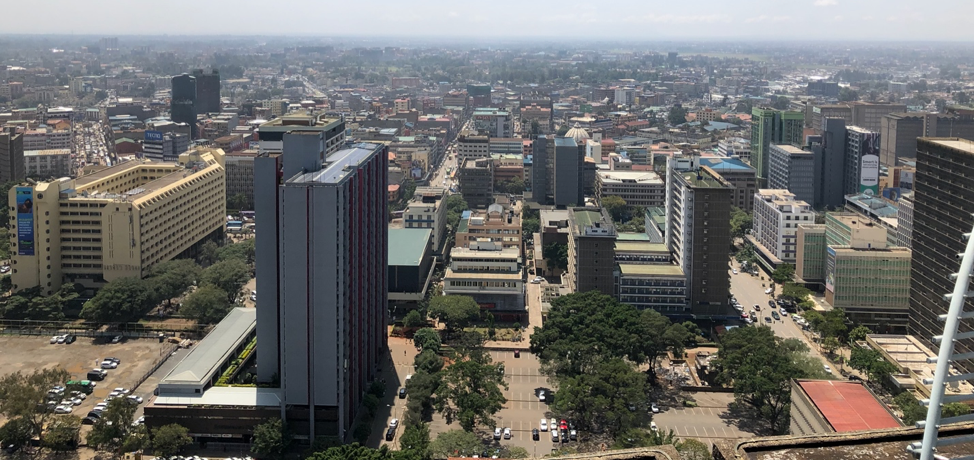Nairobi: Profile of a Global City
Africa is urbanising faster than any other continent… Cities produce difference—and they accommodate difference. African cities are no exception. They rather seem to accelerate processes of differentiation to a degree that makes it difficult to conceive them as an entity, to understand their social complexities and, not least, to govern them.[1]
Formation
Nairobi is the capital and largest city of Kenya. It was founded in 1889 by the colonial British, as a rail depot on the Uganda Railway. The history and spatial organization of the city shows this colonial past.[2]When Kenya gained independence in 1963, Nairobi became the nation’s capital. The city name is derived from the Maasai name ‘Enkare Nairobi’ which translates ‘cool water’, referring to the water of Nairobi River that flows through the city.

According to the 2019 census the city proper had a population of 4.6 million while the metropolitan area had a population of 9.3 million.[3] The city is growing rapidly, projected to surge 26% by 2025.[4]
Ethnic and Tribal Identity
In Nairobi (and Kenya at large) there is a lot of pride in which area of the nation one originates. Ethnic and tribal identity has seen a clear downgrade on the potential of the city flourishing. People do not want to put their differences aside to work towards the welfare of the city. There are about 42 tribes in Kenya with different languages and cultures that all merge to become a unique mix of Kenyan culture. The statistics show that six of the largest tribes combine to comprise about half the population and hence there is a higher influence on Kenyan culture from the representatives of these ‘big’ tribes.[5]
Political Climate
Unfortunately, some political leaders have used identity politics to create tension, division, and enmity among the people. It was this kind of manipulation that ultimately caused unanticipated violence during the 2007-08 general election, resulting in over 1,000 dead and 350,000 displaced. It has not been the same for many families ever since.[6] Surprisingly, too, is that this identity politics has crept into some churches. Some pastors are even guilty of enticing their congregants to vote for certain leaders because of their tribal affiliation. There are cases in some churches where members have developed bitter relationships amongst each other because of ethnic identity. I’m informed by an elderly friend who has lived in the city for over three decades that some churches conduct their services in their own vernacular language without giving any thought to those who might be present and with barrier to understanding.
City Attractions
The city not only boasts of its green scenery and cooler climate, it is the only city in the world that has a unique kind of park: Nairobi National Park. This major tourist attraction is the only game reserve found within a city. Here within view of Nairobi’s skyline one can see giraffes, zebras, and even lions. The city has an elevation of 1,795 metres (5,889 ft) above sea level. One can grasp the flavor of the city by drinking coffee or tea in a cafe downtown or by going atop the Kenyatta International Conference Centre to see the city from above.

Economic Growth and Development
Nairobi is home to thousands of international companies and organizations, including the Nairobi Securities Exchange. The United Nations Office in Nairobi (UNON), one of the major United Nations office sites hosting numerous different UN agencies, is a significant presence in the city. It also hosts the global headquarters for two programmes: the United Nations Environmental Programme (UNEP) and the United Nations Human Settlements Programme (UN-Habitat). The United Nations Environment Programme (UN Environment), is responsible for coordinating the UN’s environmental activities and offering assistance to developing countries in implementing environmentally sound policies and duty. And there are several nice hotels with luxurious accommodations and amenities. More importantly for Nairobi’s future are many small, innovative tech companies started by a young generation of tech-savvy Kenyans. In contrast to the formal economies of the western cities, Nairobi has a complex mix of formal and informal economies.[7] With high internet penetrate and an increasingly educated population, Nairobi shows great promise as a leader in the region.
Disadvantages, Housing Settlement, & COVID-19 Effects
The drawback facing the city and the country at large is corruption and greed from political leaders. There’s a disparity between the rich and the poor. Most often the former taking advantage of the latter. This is a very evident reality in Nairobi. The poor suffer without basic human necessities like as safe drinking water and proper sewage infrastructure in their settlements.[8]There are frequent sewer blockages within many communities which causes vulnerability to various kinds of disease outbreaks. Some areas are forced to purchase water at an unfair cost because city cartels (some who are politicians) use this as a strategy to be voted into office falsely promising the people they will resolve the issue. But alas! It’s all propaganda.
Nairobi is home to more than half of its residents living in informal settlements (56% see Data Profile). Nearly a third are poor, while only 9 percent of people living in formal settlements are poor. This is an estimation of approximately 2.5 million slum dwellers in about 200 settlements. One of Nairobi’s best-known slums is Kibera, home to at least 250 000 according to official census data. Many estimate that Kibera has far more people than officially recognized and is considered by some to be the largest slum in Africa.[9]

The housing rents are also very high, though not in all places. Many people, especially during this pandemic (COVID-19), have resolved to move back to their rural homes. Many of them have vowed not to return. Thousands of employees have been laid-off across many different companies.[10] Without reliable employment, it is very expensive to remain in Nairobi. Insecurity is another challenge. Cases of muggings, kidnapping have drastically increased ever since COVID-19 broke out. Notable areas such as the Central Business District has turned into a hub for these robberies.[11] It’s prudent therefore to avoid certain streets while visiting the city centre. My hope is that the Police Department will investigate these issues and work to regain resident’s trust within Nairobi.
Christianity
Nairobi, and Kenya at large, has regarded herself a Christian nation. The freedom of worship has not been significantly threatened. As a follower of Christ, I do not grant fully that Nairobi is a Christian city, though it is home to many Christians. However, there’s a self-deception that the city is Christian. This assumption is far from the truth. Although there is a majority claim to Christian heritage, it remains a religious veneer for many.[12] I live in Nairobi and I’ve had multiple opportunities to share the gospel of Christ with different people groups.
One evening I took a public bus from the Central Business District (CBD) to commute back at my apartment. As I conversed with people on the bus, I discovered many Nairobians were confused about the deity of Jesus Christ. I have also found that it is a common sentiment that, ‘There are many routes to reach God.’ Allah (the ‘God’ of Islam) and Yahweh (the God of Christians) are thought to be one and the same. Shaw’s research of Christianity in Nairobi notes that those who attend church regularly are found certain neighborhoods and more often among the middle class.[13]
However, the city is very promising. There’s a renewed interest in the true Gospel of Christ and a yearning for expositional preaching in the pulpits. I praise God that He has opened many eyes to the rapidly spreading deceit of the ’health and wealth gospel,’ trending very popular in Nairobi churches these days. There is yet hope.
[1]Till Förster and Carole Ammann, “African Cities and the Development Conundrum:: Actors and Agency in the Urban Grey Zone,” in African Cities and the Development Conundrum, ed. Till Förster and Carole Ammann, vol. 10 (Brill, 2018), 3, https://www.jstor.org/stable/10.1163/j.ctvbqs4gq.8.
[2]Melissa Wanjiru-Mwita and Frédéric Giraut, “Toponymy, Pioneership, and the Politics of Ethnic Hierarchies in the Spatial Organization of British Colonial Nairobi,” Urban Science 4, no. 1 (2020): 2, https://doi.org/10.3390/urbansci4010006.
[3]Njange Maina, “2019 Population Census Report Released,” People Daily, November 4, 2019, https://www.pd.co.ke/news/national/2019-population-census-report-released-12116/.
[4]Tytti Mälkki, “Nairobi: Global Business Cities 2025 Report,” August 2019, 11, https://www.statista.com/study/66297/nairobi/.
[5]Christopher B. Yenkey, “Mobilizing a Market: Ethnic Segmentation and Investor Recruitment into the Nairobi Securities Exchange,” Administrative Science Quarterly 60, no. 4 (December 1, 2015): 571–72.
[6]Human Rights Watch, “Ballots to Bullets: Organised Political Violence and Kenya’s Crisis of Governance”, vol. 20, no. 1, Human Rights Watch: New York, 2008.
[8]“Why Kenya’s Urban Poor Are Exploited by Informal Water Markets,” Water Politics, August 31, 2020, http://www.waterpolitics.com/2020/08/31/why-kenyas-urban-poor-are-exploited-by-informal-water-markets/.
[9]Amélie Desgroppes and Sophie Taupin, “Kibera: The Biggest Slum in Africa?,” Les Cahiers d’Afrique de l’Est / The East African Review, no. 44 (September 1, 2011): 23–33; Neil Kleiman et al., “Map Kibera,” Innovation and the City (Center for an Urban Future, 2016), https://www.jstor.org/stable/resrep14850.10.
[10]Paul Wafula, “Over One Million Rendered Jobless in Kenya as Covid-19 Takes Toll on Businesses,” The East African, June 5, 2020, https://www.theeastafrican.co.ke/tea/business/over-one-million-rendered-jobless-in-kenya-as-covid-19-takes-toll-on-businesses-1442672.
[11]“Crime in Nairobi,” Securex Agencies Ltd (blog), accessed October 31, 2020, https://www.securexafrica.com/tag/crime-in-nairobi/.
